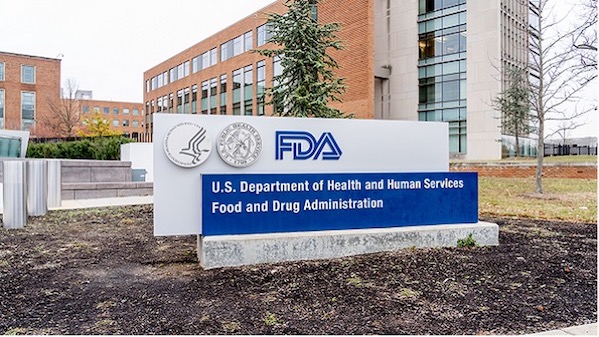Krystal Gets First FDA Approval for Redosable Gene Therapy, Rare Skin Disease
May 24, 2023
Source: drugdu
 527
527
By Tristan Manalac

Pictured: Blue sign outside FDA building/JHVEPhoto/Adobe Stock
The FDA has approved Krystal Biotech’s topical gene therapy beremagene geperpavec-svdt, now to be marketed as Vyjuvek, for the treatment of the rare skin disease dystrophic epidermolysis bullosa, the company announced Friday.
Vyjuvek’s label covers its use in dystrophic epidermolysis bullosa (DEB) patients aged six months and above bearing mutations in the COL7A1 gene. Friday’s approval makes Vyjuvek therapy the first-ever redosable gene therapy and the first DEB therapeutic to hit the market.
“Until now, there have been no approved treatment for DEB in the United States, and patients, families and physicians were limited to palliative care,” Andy Orth, chief commercial officer at Krystal Biotech, said in an investor call Friday evening, adding that there are likely around 3,000 DEB patients in the U.S., of whom some 1,100 have confirmed diagnoses, according to claims analytics.
The company expects to launch Vyjuvek in the U.S. in the third quarter of 2023 and is eyeing European approval by 2024 and Japanese approval by 2025, Orth said.
A rare and severe skin condition, DEB is caused by mutations in the COL7A1 gene, which normally encodes for type VII collagen (COL7) proteins. COL7 is a crucial part of the anchoring fibers that connect the inner and outer layers of the skin.
In DEB, faulty COL7 manifests as very fragile skin that is highly prone to wounding, tearing and blistering, even from light friction. Eventually, these open wounds lead to fibrosis and severe infections. DEB also increases the risk of an aggressive type of squamous cell carcinoma.
Vyjuvek addresses the core problem of DEB by delivering two functional copies of the COL7A1 gene to these open wounds, thereby enabling skin cells to produce functional COL7 protein and restore the skin’s integrity.
Data from the Phase I/II GEM-1/2 trial supported the FDA’s approval of Vyjuvek. An open-label, randomized, placebo-controlled and intra-patient study, GEM-1/2 established that repeated topical treatment with Vyjuvek enhanced the expression of full-length COL7, which in turn improved wound closure and the assembly of anchoring fibrils.
In the Phase III GEM-3 study, a double-blinded, randomized, placebo-controlled and intra-patient trial, 67% of patients achieved the study’s primary endpoint of wound healing after six months, while only 22% of placebo counterparts did so.
In both trials, Vyjuvek demonstrated a favorable safety and tolerability profile, leading to no drug-related serious adverse events or discontinuations. This is reflected in its label, which bears no boxed warning or precautions for contra-indications. Vyjuvek’s label does carry a warning for accidental exposure and other mild side effects such as itching, rashes and a runny nose.
Along with Friday’s approval, Krystal Biotech was also awarded a Rare Pediatric Disease Priority Review Voucher, which it can use to assign priority review status to a subsequent drug application.
Tristan Manalac is an independent science writer based in metro Manila, Philippines. He can be reached at tristan@tristanmanalac.com or tristan.manalac@biospace.com.
By editorRead more on
- Bio-Thera Solutions’ innovative drug, Darpubayimab injection, has had its marketing authorization application accepted by the NMPA February 25, 2026
- Dashi Pharmaceuticals licenses its migraine medication to NewCo in the United States. February 25, 2026
- United Laboratories subsidiary, UBT251 injection (a Class 1 innovative drug), achieved near-20% weight loss in Phase II clinical trials February 25, 2026
- Dongyangguang Pharmaceutical’s first anti-Nipah virus “lifesaving drug” has entered clinical trials, achieving a 100% mortality protection rate in animal prevention. February 25, 2026
- 34 million patients no longer rely on imported drugs February 25, 2026
your submission has already been received.
OK
Subscribe
Please enter a valid Email address!
Submit
The most relevant industry news & insight will be sent to you every two weeks.



